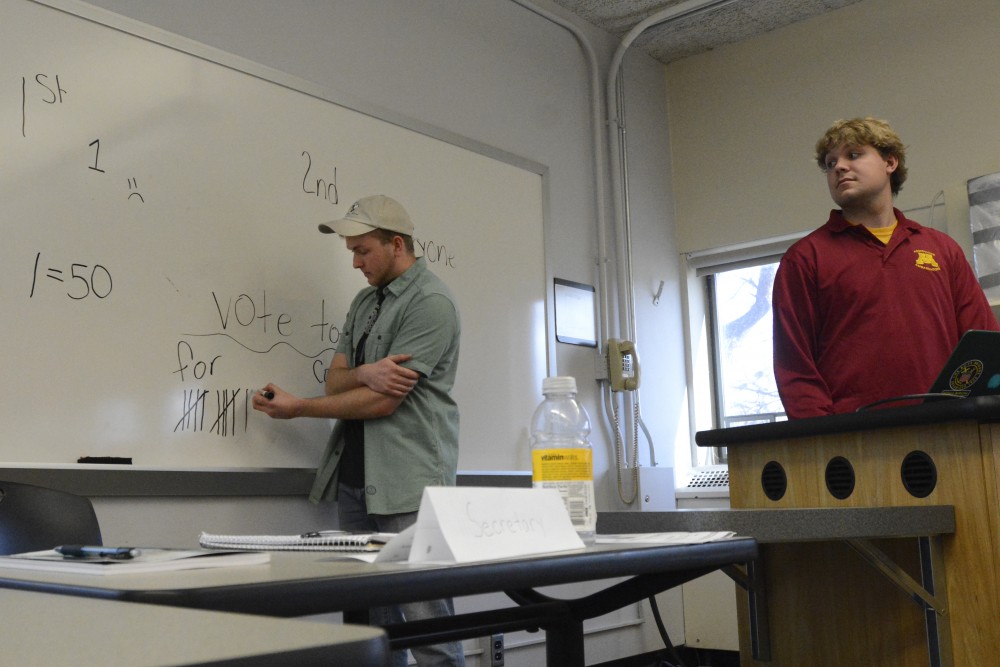There were half as many graduates from the University of Minnesota’s Spanish department in 2016 as there were in 2012.
Last year, the University of Minnesota had just one Russian language graduate.
Enrollment is declining in language programs across the board at the University. During the 2011-2012 academic year, nearly 200 undergraduates received a language degree from the University, compared to 110 last year. Some faculty members are changing curriculum to combat low interest, which they attribute to the 2008 recession and current events.
“An event like the recession doesn’t have immediate effects,” said Mary Franklin-Brown, director of undergraduate studies for the French and Italian department. “You really only start to see the effects of the recession once all of those students who were in college when the recession happened have graduated … There’s about a four year lag.”
General economic anxieties combined with the rising cost of higher education have created mounting pressures for students to choose majors outside the humanities because humanities-related jobs generally have low starting salaries, Franklin-Brown said.
Last year, 15 French majors graduated from the University — half the number that graduated during the 2011-2012 academic year, according to the University Office of Institutional Research.
“I think French is one of those standout, easily-targeted majors because people say, ‘What can you do with a major in French?’” she said, adding that many people don’t realize language degrees also teach students about culture, communication and critical thinking.
The 2008 financial crisis also impacted language programs’ budgets, said German, Scandinavian and Dutch Director of Undergraduate Studies Charlotte Melin. Many universities cut language departments’ funds or eliminated programs altogether, which hurt enrollment, she said.

Some professors say a longer history of lagging financial support is to blame for drops in language majors, too. Slavic Languages and Literatures Director of Undergraduate Studies Gary Jahn said the department, which houses the Russian major, has steadily lost faculty since he started teaching at the University in 1977.
However, fluctuations in Russian enrollment are largely motivated by current events, Jahn said.
“It follows the course of the relationship between the United States and … Russia, and the degree to which Russia is perceived to be a threat and the degree to which Russia is in the news,” he said.
This isn’t unique to Russian, said Melin, who is also involved with the national Modern Language Association. Current events, even sports, can generate more interest in a country and its language, she said.
For example, the popularity in German fluctuated in the 20th century with the fall of the Berlin Wall and the nation’s reunification, Melin said. The language also used to be studied more frequently because it was listed as a critical language by the federal government, and interest has declined slightly since the government dropped that designation, she said.
Arabic, currently listed as a critical language, is enjoying strong enrollment at the University partly because students know those skills are in demand by the U.S. government, said Katrien Vanpee, director of Arabic language instruction in the Department of Asian Languages and Literatures.
Spanish and Portuguese Studies Director of Undergraduate Studies Jaime Hanneken said the department doesn’t have a firm theory to explain dropping numbers of Spanish majors. Eighty-seven Spanish studies majors graduated during the 2011-2012 academic year, and last year, 41 people received that degree.

While fewer students may be seeking language degrees at the University overall, professors say they’re noticing increased numbers of language minors and double majors.
“The majority of our majors are double majors,” Franklin-Brown said. “It’s the way that students negotiate these social pressures … They choose one major in something ‘practical,’ and they have one major in something they’re really interested in.”
Melin said this is the case across the country.
“I think this is because there’s a high level of awareness among students that having a second language gives you a set of skills that are very useful in your career,” Melin said.
To combat misconceptions about language majors and to attract more students, last semester the French and Italian Studies Department launched a course taught in both English and French, that seeks to show students what they can do with a French major, Franklin-Brown said.
Faculty teaching the course, called “Gateways to French and Francophone Studies”, hope to use nonconventional teaching methods to draw students in, she said. For example, this month the students in the class are participating in a role-playing game to learn about the French Revolution, she said.
Majors in the German, Scandinavian and Dutch Department — which was created in 2010 after the German Studies department merged with the Scandinavian and Dutch department — have increased in the last several years, which Melin attributes to recent curriculum updates such as the addition of courses in Scandinavian crime fiction and German graphic novels, she said.
















